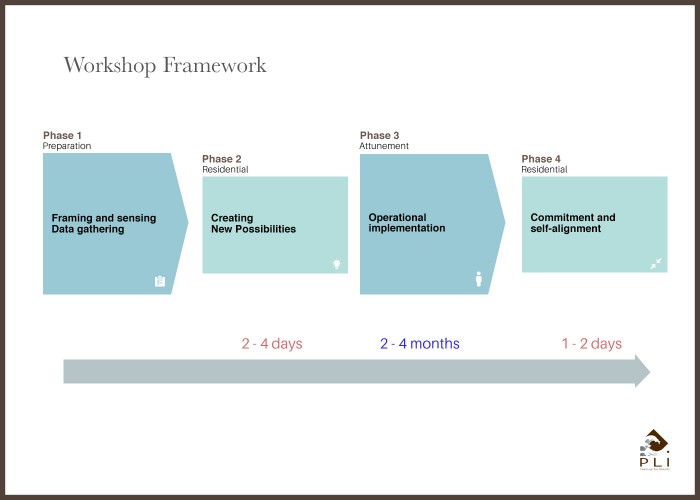PLI Workshops Framework
People at the heart of frameworks

The first stage concerns the formalization of the demand and a 360° snap assessment. It is achieved thru a sensing mechanism and the three first PLI workshop’s hours. Based on the leader’s order and mandate, who is in fact the 1st and unique transformation volunteer, PLI coaches facilitates the needed ground for the expression of a common, authentic and shared assessment and set of demands. The preliminary 360° snap assessment reveals weaknesses and strengths, and more importantly, triggers the individual engagement in the transformation process.
The second stage, residential, is about “Creating new possibilities“. In order to clear an inspiring horizon, the executives are invited in a creative exploration where there is no room for “impossible”, “forbidden”, “not invented here”, “did it already”, justifications, scams and taboos. The team could then define a new identity and concrete ambition. The team debates strategic and operational alternatives thru a narrative and fun process.
The third stage concerns the field implementation and the field operational coaching. At the end of the residential team stage, the participants specify their support needs. The concerned team leader and Human Resources finalize an approach and a schedule. “Who needs what and when to succeed together, differently, more easily?”: management support, “mentoring”, new assignment, focused sub-group for operational synergies, relationship transformation, individual operational coaching about working with…, etc.
The fourth stage theme is “Alignment and engagement”. This stage exploits the results of the implementation in order to extract the top priorities to be addressed by the team. Obsolete tasks and initiatives are canceled. With a more appropriate governance and organization, the team updates the roles & responsibilities accordingly, as well as delegations. Mutual expectations and commitments are shared with another level of authenticity giving a true chance to team vision to succeed.
